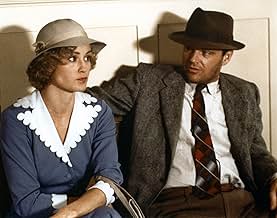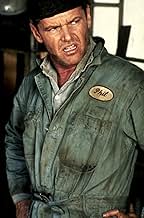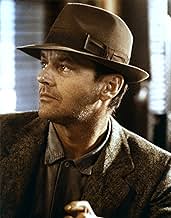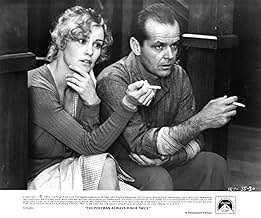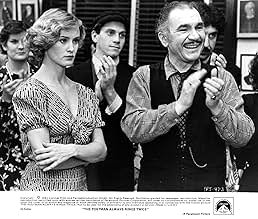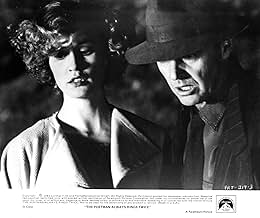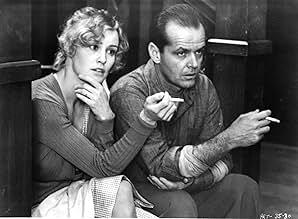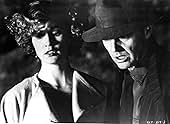Die sinnliche Frau eines Mittagswagenbesitzers und eines wurzellosen Herumtreibers beginnen eine schmutzig dampfende Affäre und verschwören sich, um ihren griechischen Ehemann zu ermorden.Die sinnliche Frau eines Mittagswagenbesitzers und eines wurzellosen Herumtreibers beginnen eine schmutzig dampfende Affäre und verschwören sich, um ihren griechischen Ehemann zu ermorden.Die sinnliche Frau eines Mittagswagenbesitzers und eines wurzellosen Herumtreibers beginnen eine schmutzig dampfende Affäre und verschwören sich, um ihren griechischen Ehemann zu ermorden.
- Regie
- Drehbuch
- Hauptbesetzung
- Auszeichnungen
- 1 Gewinn & 2 Nominierungen insgesamt
- Barlow
- (as Tom Hill)
Empfohlene Bewertungen
As I watched this 1981 film, I was pleasantly surprised by one thing...it really does stick very closely to the novel. In many, many ways the characters are nothing like the overly sanitized Lana Turner/John Garfield version. Jack Nicholson's version of Frank is far nastier than the drifter played in the 1946 film. He has a prison record and isn't likable in the least. As for Cora, she's a lot kinkier than she was in earlier versions! In fact, in 1946 they simply couldn't have stuck too closely to the novel due to the tough Production Code...which prevented nudity and kinks from being included in films...and Cora really has some kinks in this film! So, at least it is a much more faithful version of the story...albeit still yet one more version of the story. And this leads me to the important question...is it any good? Well, yes and no. The acting and production are pretty good and the story engaging...but it also is familiar (I know I've mentioned this OFTEN already) and the courtroom scene where Jessica Lange has her outburst is absolutely absurdly overacted. Still, not a bad little film.
Such raw sensuality would easily persuade a man to lose his very soul. Nicholson's part is certainly unscrupulous to begin with, but in Jessica Lange he finds a confederate with even less scruples. The legal loose ends that dangled in the earlier version are avoided this time with a more plausible chain of events... and the story ends when the story ought to end, instead of being dragged on.
Wonderful character and situation development, intriguing and engaging, even when you know the story. Nice twists of the story from the Lana Turner and Italian ("Ossessione" 1943) versions.
Lange is indeed sexy and more closely fits the part of a lower-middle class woman who married an older man, a café owner, for security than the stunning blonde bombshell Lana Turner, who was frankly a little too gorgeous for the part. John Colicos plays the café owner, Nick Papadakis, with clear fidelity to Cain's conception. In the 1946 production, the part was played by Cecil Kellaway, who was decidedly English; indeed they changed the character's name to Smith. Also changed in that production was the name of the lawyer Katz (to Keats). One wonders why. My guess is that in those days they were afraid of offending Greeks, on the one hand, and Jews on the other. Here Katz is played by Michael Lerner who really brings the character to life.
Jack Nicholson's interpretation of Cain's antihero, an ex-con who beat up on the hated railway dicks while chasing any skirt that came his way, the kind of guy who acts out his basic desires in an amoral, animalistic way, was not entirely convincing, perhaps because Nicholson seems a little too sophisticated for the part. Yet, his performance may be the sort better judged by a later generation. I have seen him in so many films that I don't feel I can trust my judgment. My sense is that he's done better work, particularly in the two films mentioned above and also in Chinatown (1974), One Flew Over the Cuckoo's Nest (1975) and such later works as The Shining (1980) and Terms of Endearment (1983).
The problem with bringing Postman successfully to the screen is two-fold. One, the underlying psychology, which so strongly appealed to Cain's depression-era readership, is not merely animalistic. More than that it reflects the economic conflict between the established haves, as represented by the greedy lawyers, the well-heeled insurance companies, the implacable court system and the simple-minded cops, and to a lesser degree by property owner Nick Papadakis himself, and the out of work victims of the depression, the have-nots, represented by Frank and Cora (who had to marry for security). Two--and this is where both cinematic productions failed--the film must be extremely fast-paced, almost exaggeratedly so, to properly capture the spirit and sense of the Cain novel. Frank and Cora are rushing headlong into tragedy and oblivion, and the pace of the film must reflect that. A true to the spirit adaptation would require a terse, stream-lined directorial style with an emphasis on blind passions unconsciously acted out, something novelist Cormac McCarthy might accomplish if he directed film. I think that Christopher Nolan, who directed the strikingly original Memento (2000) could do it.
For further background on the novel and some speculation on why it was called "The Postman Always Rings Twice" (Cain's original, apt title was "Bar-B-Que") see my review at Amazon.com.
(Note: Over 500 of my movie reviews are now available in my book "Cut to the Chaise Lounge or I Can't Believe I Swallowed the Remote!" Get it at Amazon!)
Wusstest du schon
- WissenswertesDavid Mamet's first screenplay.
- PatzerModern-day paper currency is used in craps game set during Great Depression, instead of silver certificate dollar bills then in use.
- Zitate
Cora: I gotta have you, Frank. If it was just us. If it was just you and me.
Frank Chambers: What are you talking about?
Cora: I'm getting tired of what's right and wrong.
Frank Chambers: They hang people for that, Cora.
- Alternative VersionenCBS edited 30 minutes from this film for its 1986 network television premiere.
- VerbindungenEdited into American Cinema: Film Noir (1995)
Top-Auswahl
- How long is The Postman Always Rings Twice?Powered by Alexa
Details
- Erscheinungsdatum
- Herkunftsländer
- Sprachen
- Auch bekannt als
- El cartero siempre llama dos veces
- Drehorte
- Barnsdall Rio Grande Service Station, Goleta, Kalifornien, USA(Cora and a Drunk Nick and Frank get Fuel)
- Produktionsfirmen
- Weitere beteiligte Unternehmen bei IMDbPro anzeigen
Box Office
- Budget
- 12.000.000 $ (geschätzt)
- Bruttoertrag in den USA und Kanada
- 12.376.625 $
- Weltweiter Bruttoertrag
- 12.383.416 $
Zu dieser Seite beitragen



